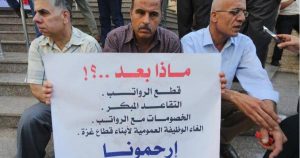
Forced retirement of security services personnel in the Gaza Strip: Challenges and consequences
Fact sheet
Forced retirement of security services personnel in the Gaza Strip: Challenges and consequences
The sheet focuses on forced retirement of security services personnel in the Gaza Strip based on degree-law No. (9) of 2017 for about (17,800) officers and non-commissioned officers, which led to psychological, social and economic harm due to this decision which violates their rights.
facts and figures:
- The Former Prime Minister Salam Fayyad issued decision No. (1/2/12/M.W/S.F.) after Hamas seized control of the Gaza Strip on June 14, 2007 for workers in the security services in the Gaza Strip not to deal with measures and decisions issued by Hamas in the Gaza Strip and whoever violates the decision will be held accountable.
- Security services adhered to the government’s decision, but since Rami Hamdallah’s government took office on July 22, 2014, the policy towards members of the security services changed, and Rami Hamdallah himself began using the term (objectors), which was used by Hamas to describe Gaza employees. Although the employees are completely subject to the decisions of the authority, when they were called upon for service and administrate the Gaza Strip crossings (Rafah, Beit Hanoun, and Karm Beit Hanoun), they proved readiness to work under all circumstances.
- The ongoing suffering of what are known as (2005 employees), as the Palestinian government repudiates the rights of these employees who were officially employed in 2005, and they are not recognized as official employees, but were placed on a social affairs clause and receive an amount of 1500 shekels.
- On April 5, 2017, the Palestinian Gazette published Decree-Law No. (9) of 2017, regarding early retirement of the Palestinian security forces, according to which Rami Hamdallah’s government referred about (17,800) employees of the security services in the Gaza Strip without complying with the minimum standards of transparency and integrity in implementing the decision, where many cases appeared when applying the law as follows:
- The associate (a 35-year-old non-commissioned officer) who deserved a rank of officer was referred to forced retirement without obtaining his periodic and due promotion as his colleagues in the West Bank, in addition to the settlements of university students listed in the records of the authority. Although the promotions bulletin was published periodically in the northern governorates.
- The double application of the retirement decision for those who are over the age of 40 and have not been referred to retirement, without a provision in the decision of the 2017 retirement law or specific criteria, which led to the inequality between workers and forcibly retired in salary and rank, as they receive twice as much as those charged for forced retirement.
- In addition to this, the financial crises that the National Authority was subjected to, which directly affected the salary disbursement rates for all members of the security services, and which had its effects on those who were referred to retirement without receiving their dues, bonuses and promotions bulletins.
Fact analysis:
- Employees between rights and retirement: Members of the security services are subject to a precise work law and structure, and they are aware of the political and economic conditions that Palestine suffers from, and owe allegiance to the institutions of the State of Palestine. Despite this, referral to retirement if the public interest requires it is a right, but it needs a general application and obtaining all rights for employees, starting with administrative procedures, promotions, and bonuses, similar to their counterparts in the northern governorates.
- Forced retirement violates the rights of members of the security services in accordance with the General Retirement Law and the Service Law in the Security Forces of 2005.
- Implementation selectivity: The forced retirement decision was implemented very selectively. Several problems emerged after applying the decision to (17800), as we find among them unqualified officers who were excluded from forced retirement even though they are over 55 years old. And others who have qualifications and under 45 years with high ranks, yet they were referred to forced retirement without obtaining their periodic rights throughout the previous years, which led to a decrease in the percentage of the retirement pension.
- The Retirement Law does not guarantee the minimum pension: Forced retirement has wasted many of the financial rights of retirees, so that the forced retiree now receives a salary of no more than 49% of the due salary, although he amounts in the statement of retirement referral to his due rank, but he does not benefit from it according to the Retirement Law and the pensions that determine the percentage of pension disbursement, according to the average salary (36) months from the last rank.
Recommendations:
Members of the security services are under the orders and laws of the official institution, but they demand administrative and financial rights like their colleagues. Especially since the retirement law was activated without activating administrative procedures and promotions for members of the security services in the Gaza Strip. Therefore we recommend the following:
- Cancellation of Decree Law No. 9 of 2017, because it is an unfair decision against a militant group that has spent its life in the service, and because its application was has many suspicions and injustice, in addition to its application to the people of Gaza only, which is considered a crime according to Palestinian law. Therefore, reversing this unjust decision is the fulfillment of the right.
- The decision to retire should be voluntary for those who wish to do so, while granting them their rights according to the rules, and that it is not obligatory.
- In case of insisting not to cancel the decision, the retirement shall be 100% of the salary according to the last salary received by the retiree before his retirement and at the rank due.





